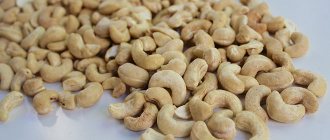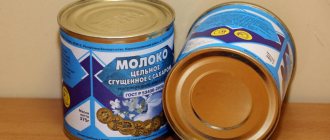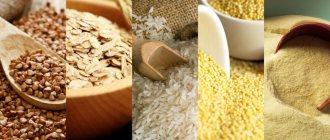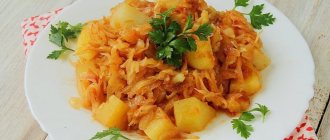With the arrival of a baby in the family, a woman faces a lot of troubles. Often a young mother is unable to eat regularly and nutritiously. Many resort to snacking.
You can replenish energy reserves and saturate your body with useful substances by eating corn flakes. This is a great option for a snack. But during lactation, the choice of food products must be approached wisely.
Many women have a question about whether corn flakes can be consumed while breastfeeding.
Breastfeeding and corn flakes
Corn flakes have been one of the most popular products for many decades. Children especially love them, but adults also do not refuse this delicacy. But, in addition to excellent taste and easy digestibility by the body, corn flakes are also very useful. Therefore, a nursing woman may well supplement her diet with this wonderful and inexpensive product. Flakes have a lot of positive properties:
- They are very nutritious as they are rich in minerals and vitamins.
- Improves intestinal motility, which promotes regular bowel movements.
- The product almost never causes allergies in a child.
- With regular use, it helps normalize blood cholesterol levels.
Considering all the positive qualities, any nursing woman can diversify her diet with corn flakes. True, such an innovation should not be done until the baby is three months old. And one more important point: the technology of preparing the product and the additives included in its composition are of great importance. For example, glazed cereals containing honey and baked milk can cause allergies and intestinal upset. Therefore, it is better to use a product with such additives.
Features of eating corn-based products
If there are no contraindications to eating corn, it is best to add boiled grains to different dishes. A mother who is breastfeeding can use the following recipes:
- Salad. Boil 1 chicken fillet, 100 g corn, 200 g rice until tender. Cut the chicken into small pieces, mix all the ingredients, add salt to taste, pour in 0.5 tsp. vegetable oil.
- Soup. Boil 400 g of beef or chicken meat and remove it. Put chopped potatoes (2 pcs.) and carrots (1 pc.) into the broth and add 300 g of corn grains. Fry 1 onion with slices of 3 tomatoes. Add the roast to the soup and bring it to a boil. When serving, add finely chopped herbs to the plate.
- Stewed vegetables with chicken and rice. Fry the meat, boil the rice. Add chopped tomatoes, bell peppers, some corn kernels and rice to the meat in a saucepan and simmer under the lid for another half hour.
We recommend that you read the Medicinal properties and contraindications of St. John's wort
Such dishes will not harm the child’s health if he does not have allergies and the gastrointestinal tract functions normally.
Boiled corn
Boiled corn is not harmful to a nursing mother, so it can be eaten in the first weeks of a baby’s life. However, you should start with a minimal amount to check the reaction of the baby's gastrointestinal tract.
If the child’s body reacts normally on the first day, the product can be introduced into the diet. It is recommended to eat no more than 2 medium cobs per week.
If the child feels well, but the mother experiences discomfort in the stomach, grains should be temporarily excluded from the diet.
Canned corn
It is impossible to say for sure whether canned corn is useful for breastfeeding. Modern canned food contains unnatural additives to change the taste and aroma of the product and increase its shelf life. Such food will not benefit the mother, and if it enters the baby’s body during breastfeeding, it will cause diarrhea.
The jar is also important.
If it is tin, there should be no scratches or any other damage on the inside. However, you can only see this by uncorking the jar. Unprotected metal reacts with brine, forming substances hazardous to health.
Thus, during lactation, it is better for a woman to consume only home-canned product, which is prepared according to the following algorithm:
- Pour water over the cobs and place on low heat;
- remove all grains from the fruit;
- bring 0.5 liters of water to a boil;
- pour 15 g of sugar into the prepared jars, add a pinch of citric acid and 0.5 tsp. salt;
- pour boiled water over the grains and spices;
- Sterilize the jars for a quarter of an hour, roll them up and put them in a warm place for 2 days.
You can eat no more than 2 tsp per day.
Corn porridge
Many people are interested in whether a nursing mother can eat corn porridge. Since this dish is hypoallergenic, a woman can include it in her menu in the first month after giving birth. However, such food leads to weight gain. If a woman has experienced a significant increase in body weight during pregnancy, it is better to avoid this product.
When choosing porridge for children, it is recommended to give preference to products from companies that produce baby food. You should carefully study the composition - the product should not contain synthetic and allergenic additives.
Dairy-free cereals may contain gluten. This is because this product is made on the same equipment as gluten-containing cereals. If a child is allergic to this component, you need to purchase food marked “hypoallergenic” and only from companies you can trust. Manufacturers who care about their reputation, such as Nestlé, indicate information about the presence of gluten on the box.
About harm and benefit
Any product that appears on the table of a nursing mother is always considered from these two positions: positive qualities and disadvantages. Corn flakes help a woman after childbirth restore the balance of strength in the body, saturate it with vital minerals, which are abundant in corn. The combination of all the elements contained in the flakes replenishes the energy reserves of a newborn baby. After all, a growing body needs a lot of energy. In addition, all cereals, and corn is part of their group, are capable of providing a whole range of beneficial effects:
- strengthen the walls of blood vessels;
- stimulate immune forces;
- activate the flow of bile, which is beneficial for digestion in general;
- have a beneficial effect on brain activity.
Obviously, all of the listed characteristics are equally useful for mom and baby. And since natural corn flakes do not contain harmful additives such as gluten, they may well become one of the main components of the diet.
Precautionary measures
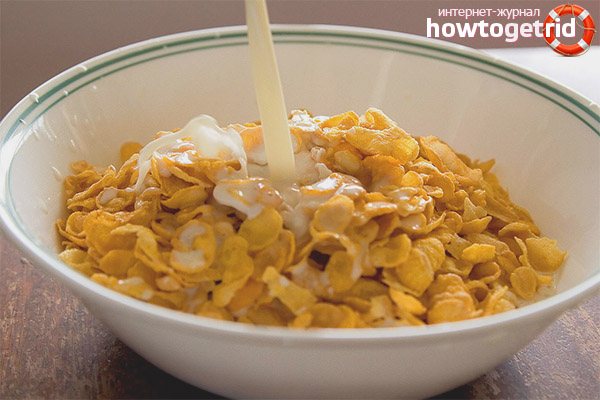
During breastfeeding, safety should always be in the foreground. Therefore, it is not recommended to overuse corn flakes, since their excessive presence in a woman’s diet can result in weight gain. Cereals cannot be used as a meal replacement; the product can only be used as a snack, as it quickly satisfies hunger. Cereals can be a high-calorie second breakfast dish.
Cautions
For mother
- Do not forget that such food is not related to dietary food. There is sugar, butter and flour, so you should not eat corn flakes regularly and in large quantities, as this can lead to excess weight.
- You should not eat the product as a main dish when you are hungry. It is best to consume it as a snack; it is quite possible to eat it for a second breakfast or afternoon snack.
For babies
For the first time, the baby can be given a taste of cereal no earlier than after 3-4 months. Monitor the body's reaction very carefully - if there are any negative signals, you should stop consuming the product for at least a month.
If the baby’s body does not show a negative reaction after two days, you can continue to feed him cereal, but the portions should increase gradually! Under no circumstances should you overeat; the maximum single portion cannot exceed 100 grams, otherwise everything can end very badly.
It is strongly not recommended to give the product to your child more than 2 times a week . If these rules are neglected, the baby may have an upset stomach.
Product selection rules
With proper placement of accents in the menu of a nursing mother, corn flakes will definitely demonstrate their capabilities. If the product is of good quality. You can determine this criterion if you pay attention when purchasing:
- On the technology of product preparation.
- Ingredients (natural flakes will contain no preservatives or dyes).
- The presence of potential allergens, which, in principle, is also included in the list of additives - chocolate, honey, sweeteners.
These components add calories to the product, but can cause an allergic reaction in the baby.
What kind of corn to eat during breastfeeding?
A nursing mother can and should include corn in her diet. But not all products based on it can be eaten. Let's look at them in more detail:
- Boiled corn in its pure form can only be consumed carefully and in small doses. It can cause indigestion in both mother and baby, and increases gas formation, especially if you use old ones with dense grains.
- Baking from corn flour is not very common in our country. However, such flour can be purchased at the store. Products based on it can be used by a nursing mother. However, if she or the baby suffers from gluten intolerance, it is better to avoid such flour. Technology is not always followed in production, and flour can be mixed with wheat or rye.
- Boiled porridge can be consumed by a nursing mother from the first minutes of a child’s life. This is the healthiest option for eating corn. This porridge can be given to your baby at the beginning of introducing complementary foods, by grinding the cereal in a coffee grinder or by purchasing ready-made “baby porridge”.
- Corn flakes and sticks are a sweet snack for snacking. Both adults and children love to eat them. For a nursing mother, this product is suitable when the baby is at least 3 months old. In addition to corn flour, sticks and flakes contain sugar, molasses and vegetable (and sometimes palm) fat. That is why you should use both sticks and corn flakes with caution, studying the composition before purchasing.
- Canned corn is taboo for a nursing mother. It contains preservatives, dyes, and flavor enhancers. Even cans poison corn, releasing dangerous bisphenol A from the inner surface (suppresses the baby’s endocrine system, can cause diabetes, autism, and oncology).
- Popcorn is another unsuccessful option for eating corn for a nursing mother. It is not recommended to use it at all when breastfeeding. It contains a lot of fats, dyes, flavors, sugar or salt. An exception is homemade popcorn made from special varieties of corn, cooked in the microwave.
You can definitely eat porridge while breastfeeding, cereals and sticks will wait until the baby is at least 4-6 months old, and you should abstain from canned corn until breastfeeding is completed.
How to eat cereal
There are no special rules for eating such a simple dish as cereal, although there are several options suitable for mothers:
- You can dilute the flakes with hot boiling water or tea. Cow's milk is not recommended in the first months.
- To enhance the taste of the dish, you can add some dried fruits.
- It is recommended to combine corn flakes with berries and freshly squeezed juice.
- If a woman has diabetes or has intestinal problems, it is better to avoid cereal. This restriction also applies to ladies with curvy figures.
By following the tips given here, every nursing mother will only enrich her diet with one more healthy dish. If a woman consumes corn flakes correctly, the child’s growing body will receive all the substances necessary for its development.
How interesting it is to use corn in a nursing mother's menu
By combining corn with other products, a nursing mother can interestingly diversify her diet. You can pay attention to the following options.
Chicken soup with corn
Ingredients:
- 300 g chicken breast.
- 2 potatoes.
- 1 medium carrot.
- 1 small onion.
- 2 ears of corn.
- Salt and herbs to taste.
Preparation:
- Boil the chicken and remove from the broth.
- Separate the corn kernels from the cobs and pour into the broth. Add finely chopped potatoes, carrots and onions there. Cook for 20 minutes.
- Separate the cooled meat from the bone, cut it and put it in the soup.
- One minute before it’s ready, add the herbs to the soup.
Chicken and corn are always a good combination
Video: cereal - benefits and harm
Corn, cornmeal and grits are very healthy foods high in vitamins and minerals. Corn stimulates intestinal function and lowers cholesterol levels in the blood. In addition, it is easily digestible and rarely causes an allergic reaction, which is important when breastfeeding. After all, the baby’s body is just getting used to new food and environment.
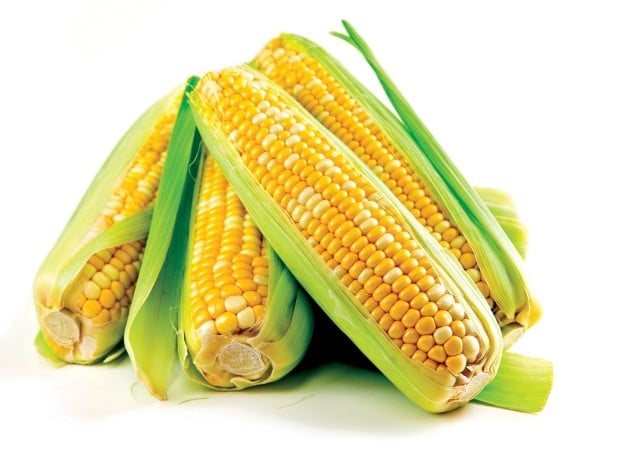
The effect of corn on lactation
Corn is one of the products recommended for inclusion in the diet during lactation and has a beneficial effect on the body of mother and baby when consumed correctly. There is an opinion that corn increases the amount of milk in lactating women, but this has not been proven by serious research. Nevertheless, corn has an undoubted positive effect on the body weakened by childbirth and feeding, improves digestion, removes harmful elements, which has a good effect on lactation. Boiled corn and porridge made from corn grits will come in handy if there is a shortage of milk; moreover, this product very rarely causes allergies, that is, it is practically safe for both mother and infant.
As you know, a young mother who is breastfeeding should treat her diet with increased care.
Among the products that raise doubts, it is necessary to note corn flakes.
It contains a large amount of minerals and vitamins, which stimulates intestinal function and lowers cholesterol levels in the blood.
Speaking about whether such a product can be eaten by a nursing mother, it should be noted that corn flakes are best absorbed
Therefore, an allergic reaction is very rare. This factor is very important during breastfeeding, since at this time the infant’s body is just beginning to get used to new food.
ADVICE:
If a nursing mother plans to eat corn flakes that do not contain various additives, then there is nothing dangerous to health. But, if we are talking about a product that is glazed, with the addition of honey or baked milk, then you should refrain.
From what month?
Despite the fact that natural corn flakes cannot bring anything bad to the baby’s body, this does not mean that they can be eaten at any time. Until the child reaches the age of 3 months, you should refrain from consuming such a product.
If the baby shows a tendency to allergic reactions, then the mother can start eating cereal no earlier than the baby is 4 months old.
The benefits of corn
Corn strengthens the immune system and saturates the body with energy, gives vigor and strength, normalizes blood pressure and strengthens the walls of blood vessels. Cereals are a good preventative against constipation and remove bile from the body. Corn gives strength to the baby, promotes normal growth and development, improves digestion and helps to quickly adapt to new conditions.
In addition, the product saturates the mother’s body with vitamins and minerals, the lack of which is especially felt after childbirth. It is important that corn does not contain gluten or lactose, which is important when breastfeeding. Cereal does not cause allergies or other negative reactions in either children or adults.
Corn porridge is healthy and hypoallergenic, so this dish can be eaten already in the second month after childbirth. However, in the first six months of lactation, pediatricians recommend consuming porridge with water, since milk contains dangerous cow protein. Gradually dilute the water with milk and completely switch to milk porridge by 6-7 months. By the way, it is corn porridge with water that is given to infants as their first complementary food.
If the baby tolerates grains normally, corn puree, corn flakes and baked goods made from corn flour can be introduced into the nursing mother's diet. However, you need to eat such foods in limited quantities, since excess food and overeating lead to increased gas formation and colic in infants. But corn sticks and canned corn should be excluded from the menu.
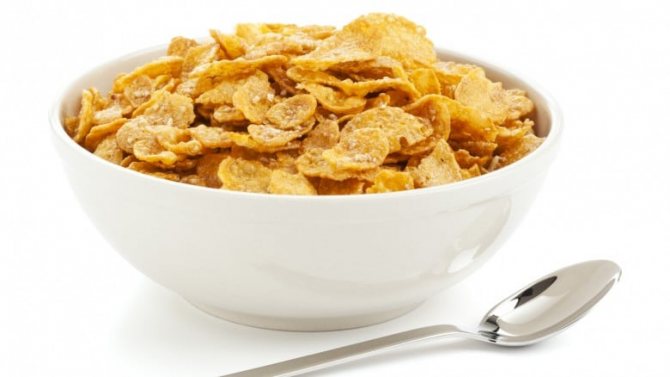
What is the benefit of the product?
Corn flakes are a common and favorite delicacy for many. However, it turns out that they are not only tasty, but also beneficial for the body of a nursing mother.
- They contain a large amount of vitamins A, PP, E, as well as microelements such as cobalt, magnesium, zinc, potassium, sodium and others.
- Glutamic acid activates metabolic processes in the brain and helps improve memory.
- Among the large number of amino acids contained in this product, tryptophan occupies the main place. It is this amino acid that is the basis for the body’s production of serotonin, the hormone of joy. Breastfeeding women often suffer from a lack of this hormone due to constant lack of sleep and overwork.
- Natural pectins perform an antioxidant function, preventing the development of various tumors.
- Fiber improves digestion and stimulates the gastrointestinal tract. It is believed that a nursing mother should not consume foods that contain a lot of fiber in large quantities, so as not to cause intestinal colic and bloating in the newborn baby.
- Starch helps preserve nerve cells and is involved in the growth of muscle tissue.
The benefits and harms of corn flakes
Corn flakes contain a lot of useful elements, including vitamins A and E, niacin, magnesium and zinc, sodium and others. This product has a positive effect on digestion, normalizes metabolism, stimulates brain function and improves memory.
The cereal contains tryptophan, which produces the main hormone of joy - serotonin. Eating cereal will improve your mood, give you vigor and strength, and fill your body with energy. The starch in the product ensures normal growth of the child and preserves nerve cells.
Corn contains large amounts of fiber, which stimulates the intestines and improves digestion. But at the same time, fiber increases gas formation, which causes severe colic in infants. Therefore, during lactation, foods high in fiber can be consumed, but in limited quantities.
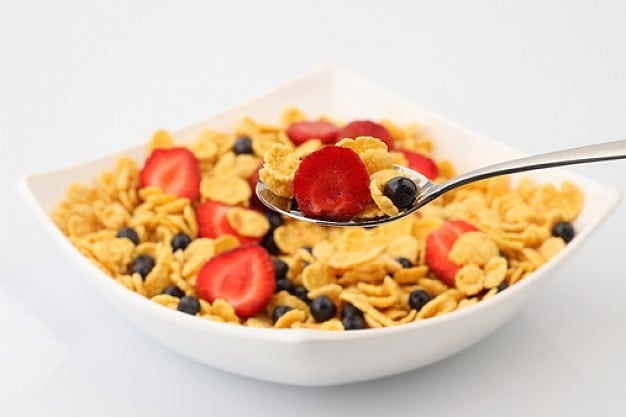
A little history of corn flakes
Today, corn flakes are a very popular product loved by many. It's hard to believe that they appeared by an absurd accident.
The invention of corn flakes is attributed to the owners of the Battle Creek boarding house, the Kellogg brothers. According to one version, the corn flour, from which some dishes were prepared in the sanatorium, had deteriorated a little. Since this product was strictly registered, the brothers decided, no matter what, to use it to prepare dough. However, the cooking did not go well: the dough curled and broke into lumps and flakes.
Desperate, the Kellog brothers decided to use the dough at all costs, and fried the resulting lumps. To everyone's surprise, some of the cereal became fluffy and crispy. At their own peril and risk, the brothers served the resulting dish to the table. And they were right: cereal with milk and marshmallow pieces became one of the most favorite dishes at the Battle Creek boarding house.
Subsequently, the brothers slightly changed the recipe, which made the cereal more popular. In 1894, the Kellogs patented their invention and by 1906 began mass producing breakfast cereals. In the USA, this product gained incredible popularity by the middle of the twentieth century, and several decades later it came to us.
Why are corn sticks dangerous for a nursing mother?
Corn sticks contain artificial and chemical additives, including flavorings, flavor enhancers, vegetable protein and other harmful substances. The main ingredient of such a product is boiled corn grain without shell, and not corn flour. The sticks contain virtually no dietary fiber, vitamins and minerals.
To prepare the sticks, the grain is dipped in a solution with salt, then various chemicals are added. The mass is squeezed out at high temperature and dried. After such heat treatment, corn loses all its beneficial properties.
Note that corn sticks are a high-calorie product with a high carbohydrate content, which leads to excess weight. In addition, it causes an allergic reaction and impairs digestion in infants.
Corn sticks should not be consumed by people with diabetes, those who are prone to excess weight, or those with intestinal and stomach diseases. The use of this product is not recommended for children, pregnant and lactating women.
With the arrival of a baby in the family, a woman faces a lot of troubles. Often a young mother is unable to eat regularly and nutritiously. Many resort to snacking.
You can replenish energy reserves and saturate your body with useful substances by eating corn flakes. This is a great option for a snack. But during lactation, the choice of food products must be approached wisely.
Many women have a question about whether corn flakes can be consumed while breastfeeding.
Cooking corn porridge
Making porridge is quite simple. Take 3 glasses of water, 3 times less cereal, 50 g of butter (any) and add salt to taste.
Before preparing the porridge, rinse the cereal, add water and cook for 20-25 minutes over low heat. Add oil, leave in a warm place until ready.
Corn porridge is a tasty, safe dish. But care must be taken in everything so as not to harm the child. Introduce gradually, avoid frying and adding milk, do not abuse sugar and salt. This will contribute not only to proper digestion in the child, but also to the loss of weight in the woman gained during pregnancy.
Useful and not so useful properties
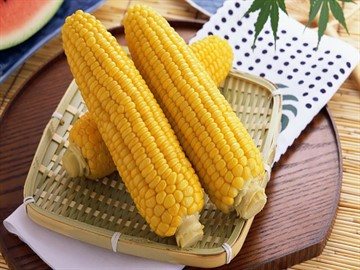
Since then they have not lost their popularity. Previously, cereal was made from corn kernels by hand by boiling them in syrup and then frying them. Today, this process has become much easier thanks to the advent of high-tech equipment. In addition to flour, sugar and butter, other ingredients are also used today. This allows you to diversify the taste of the flakes.
Manufacturers claim that this product is very useful. To understand whether corn flakes really have a beneficial effect on the body, you need to know their composition and nutritional value. The calorie content of this product is about 325 kcal. 100 grams contain approximately 1.2 g of fat, 75 g of carbohydrates and 8.3 g of protein.
Corn flakes are rich in the following vitamins and macro- and microelements: pyridoxine, retinol, cobalt, thiamine, riboflavin, aluminum, pantothenic acid, biotin, alpha tocopherol, phosphorus, zinc, folate, niacin, calcium, sulfur, potassium, sodium, boron, manganese, tin, titanium, chromium, nickel, molybdenum, copper.

Beneficial properties of corn flakes:
- normalization of digestive processes;
- memory improvement;
- prevention of the development of vitamin deficiency;
- mood lifting;
- strengthening the immune system;
- toning the body;
- stabilization of the central nervous system;
- strengthening muscle tissue;
- activation of brain activity;
- preventing the transformation of healthy cells into malignant ones;
- improving the condition of hair and skin.
At the same time, corn flakes also have disadvantages.
According to the results of research by British scientists, the following facts were established:
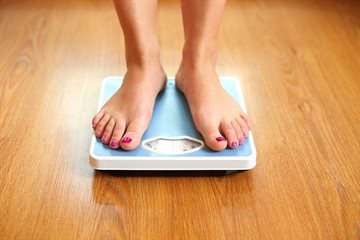
- the product is high in carbohydrates because it is made from the highest grades of corn flour;
- A lot of sugar is used in making cereal. The use of such a product can negatively affect the well-being of diabetics and adversely affect their figure;
- According to the cooking technology, the flakes are fried. This means the product contains trans fats. When these elements enter the body, they displace beneficial fatty acids from cell membranes. this leads to disruption of metabolic processes and the appearance of various diseases of internal organs;
- In the production of corn flakes, artificial flavors, flavor enhancers, and preservatives are often used. These substances have a negative impact on health.
Healthy Snack: Can I Eat Corn Flakes While Breastfeeding?
With the arrival of a baby in the family, a woman faces a lot of troubles. Often a young mother is unable to eat regularly and nutritiously. Many resort to snacking.
You can replenish energy reserves and saturate your body with useful substances by eating corn flakes. This is a great option for a snack. But during lactation, the choice of food products must be approached wisely.
Many women have a question about whether corn flakes can be consumed while breastfeeding.
Corn flakes were introduced in 1894. Since then they have not lost their popularity. Previously, cereal was made from corn kernels by hand by boiling them in syrup and then frying them.
Today, this process has become much easier thanks to the advent of high-tech equipment. In addition to flour, sugar and butter, other ingredients are also used today. This allows you to diversify the taste of the flakes.
Manufacturers claim that this product is very useful. To understand whether corn flakes really have a beneficial effect on the body, you need to know their composition and nutritional value. The calorie content of this product is about 325 kcal. 100 grams contain approximately 1.2 g of fat, 75 g of carbohydrates and 8.3 g of protein.
Corn flakes are rich in the following vitamins and macro- and microelements: pyridoxine, retinol, cobalt, thiamine, riboflavin, aluminum, pantothenic acid, biotin, alpha tocopherol, phosphorus, zinc, folate, niacin, calcium, sulfur, potassium, sodium, boron, manganese, tin, titanium, chromium, nickel, molybdenum, copper.
Beneficial properties of corn flakes:
- normalization of digestive processes;
- memory improvement;
- prevention of the development of vitamin deficiency;
- mood lifting;
- strengthening the immune system;
- toning the body;
- stabilization of the central nervous system;
- strengthening muscle tissue;
- activation of brain activity;
- preventing the transformation of healthy cells into malignant ones;
- improving the condition of hair and skin.
At the same time, corn flakes also have disadvantages.
According to the results of research by British scientists, the following facts were established:
- the product is high in carbohydrates because it is made from the highest grades of corn flour;
- A lot of sugar is used in making cereal. The use of such a product can negatively affect the well-being of diabetics and adversely affect their figure;
- According to the cooking technology, the flakes are fried. This means the product contains trans fats. When these elements enter the body, they displace beneficial fatty acids from cell membranes. this leads to disruption of metabolic processes and the appearance of various diseases of internal organs;
- In the production of corn flakes, artificial flavors, flavor enhancers, and preservatives are often used. These substances have a negative impact on health.
Scientists, while observing children aged 5-10 years, found that those children who eat corn flakes with milk for breakfast every day face the problem of excess weight after a year.
Can a nursing mother eat?
The question of whether corn flakes can be consumed while breastfeeding is relevant for most women who, before pregnancy, loved to eat such a treat with milk. Experts do not prohibit including such foods in the diet.
Corn is easily digestible and does not contain gluten, which often causes allergies in children. Therefore, high-quality flakes without additives will not harm the mother and baby.
This product will saturate the woman’s body with vitamins and minerals, the deficiency of which is often observed after childbirth. With breast milk, the baby’s body receives all the components of the dishes that the mother eats.
The starch and fiber contained in the flakes will have a beneficial effect on the child’s growth and the functioning of his digestive system. Also, the corn product saturates the baby’s body with vitamins and microelements that are needed for good immunity and proper development.
Today the range of corn flakes is very wide. On the shelves you can see options with honey, chocolate, baked milk and other additives.
This option for a quick breakfast is very tasty, but is not recommended during breastfeeding: it can provoke allergies in the baby and disturbances in the gastrointestinal tract. A woman should also not eat glazed flakes.
They usually contain sweeteners, flavors, flavor enhancers, and dyes. Such substances will not benefit the mother and baby.
You should not include corn flakes in your diet immediately after giving birth. The first months are adaptive for the child. During this period, a woman needs to adhere to a strict diet. When the baby turns three months old, the mother can diversify her menu with cereal.
If a child has a tendency to allergies, suffers from flatulence and colic, then the corn product should be abandoned until the functioning of the baby’s digestive and immune systems is normalized.
How to choose?
Today, markets, stores and supermarkets offer corn flakes, which differ in composition, cost, and manufacturer. It is important for a nursing woman to know the criteria for choosing a quality product. First of all, you should pay attention to the composition.
A high-quality and natural product contains corn flour or cereal, butter, sugar. Salt is allowed. There should be no additional additives.
Some manufacturers indicate on the packaging that the product is enriched with vitamins. These substances are usually artificial and do not provide any benefit to the body.
Some manufacturers indicate the following information on the packaging: “Recommended by the Nutrition Research Institute.” This is often done by unscrupulous companies who are trying to attract a potential buyer. The fact is that the Nutrition Research Institute does not have the right to recommend any product. The main task of this organization is to check the product for the presence of dangerous components.
It is necessary to give preference to products from well-known brands, which are famous for their high quality and natural composition. It is important to pay attention to the expiration date and compliance of storage conditions in the store with the manufacturer’s recommendations. Before purchasing, you need to inspect the packaging for integrity.
If you have doubts about the quality and safety of a store-bought product, but want to treat yourself to corn flakes, then you should try making them yourself.
Directions for use and precautions
Corn flakes are a simple, tasty and inexpensive option for breakfast or snack. During lactation, a woman should think first of all about the health and safety of her child.
You should not overuse corn flakes. They can lead to increased gas formation, colic, and an allergic reaction in the child.
You should stop eating corn flakes in the following cases:
- diabetes mellitus of the second form;
- caries;
- obesity;
- increased blood clotting;
- individual intolerance to the product;
- disorders in the intestines and stomach.
Corn flakes should be introduced into the diet carefully. First, a woman should try one tablespoon of the product diluted with water. The child should be monitored over the next two days. If the baby has increased gas production, a rash on the body, or diarrhea, then it is worth postponing the introduction of a new product.
If there are no negative changes in the baby’s condition, then you can continue to eat corn flakes. The size of a single portion should be increased gradually. You should eat a dish of corn flakes no more than 2-3 times a week. This will be quite enough to saturate the body with useful substances without harm to your figure and health.
It is recommended to consume corn flakes in the first half of the day. They are suitable as a second breakfast snack. They should not replace a full meal.
The fact is that they are quickly digested. After a short time, the woman will begin to feel hungry again. This can lead to overeating. It is not recommended for nursing women to dilute cereal with cow's milk.
It is better to use hot water for this. If you want to improve the taste, you can add some dried fruits.
About the benefits and harms of cereal in the video:
Thus, a woman during lactation is allowed to consume corn flakes 3-4 months after giving birth. By this time, the child’s digestive and immune systems will become stronger, ready for a new product.
It is important to give preference to cereals without any additives that can cause allergies or problems with the stomach or intestines in the baby. It is important to remember that such food is high in calories. Therefore, if you have problems with excess weight, then it is better to refuse such a product or use it periodically in small quantities.
Source: https://momjournal.ru/kormlenie/grudnoe-vskarmlivanie/mozhno-li-kukuruznye-xlopya.html
Can a nursing mother eat cereal?
You have become a mother!!!
And we immediately encountered a huge number of problems and questions.
And in the first place is not only how to care for a newborn, but also how to eat now. After all, you need food to be:
- useful,
- delicious
- and prepared quickly.
You may think that these three parameters are very difficult to combine. But actually it is not. Take corn flakes, for example. It’s not true, everyone remembers them.
Let's see if flakes are suitable for a nursing mother and how to choose them correctly.
Of course, the lactation period is quite difficult, since the lists of prohibited foods are much larger than the lists of permitted ones.
But allergic reactions do not occur in every baby. This is all individual and depends on many nuances.
It is not a fact that your child is prone to allergies, and you will have to limit yourself in almost everything.
How to choose cereal: what to look for?
- Carefully study their composition and immediately set aside those that contain all kinds of preservatives and dyes of synthetic origin.
It is these ingredients that pose a danger to the child and are produced chemically.
2. You should also avoid sugary and frosted cereals.
Honey and chocolate, which are part of such products, are the strongest allergens, and sugar can cause strong fermentation in the intestines, which in turn can cause colic in the baby.
3. You should not buy cereals mixed with dried fruits, as some of them can cause allergies, as well as pain in the small tummy.
The benefits of cereal during breastfeeding
Corn flakes perfectly combine useful substances, ease of preparation, and excellent taste. It is for this reason that many new mothers use cereal for a light snack.
Regular corn flakes contain vitamins such as:
- D,
- B
- A,
- iron,
- carbohydrates
- and calcium.
At the same time, experts claim that this product improves memory. Therefore, you should not give up corn flakes during lactation.
Lyudmila Sharova, lactation consultant
Get a nutrition chart for a nursing mother right now to protect your baby from allergies, colic and abdominal pain.
Enter your email and click on the “GET” button
uroki4mam.ru
You can have flakes for a nursing mother, corn flakes for a nursing mother
Can a nursing mother have cereal? Yes, corn flakes are not contraindicated for a nursing mother, if, of course, you choose them correctly.
A nursing mother usually faces several problems at once, and all of them are related to nutrition: eating quickly, eating healthy and eating tasty. But the illusion that these 3 parameters are incompatible is really just an illusion. For example, the cornflakes that you ate so often in the past are quite suitable as an afternoon snack now.
Yes, the period of breastfeeding a child is the most difficult period of nutrition, since the list of products approved by the doctor greatly limits the choice, and besides, you really want to transfer only the most useful and necessary substances to the child through milk.
And allergies, which pediatricians so often scare women with, are an individual reaction, and it is not a fact that your baby is exposed to it.
Well, let's take a closer look at what our favorite corn flakes are made of, and we will see that corn flakes will not harm a nursing mother, if, of course, they are eaten in moderation.
Of course, when choosing corn flakes that a nursing mother will eat, you should avoid products that contain preservatives and artificial colors, since these substances are 100% “chemical” and do not bring anything useful with them. Also, don't buy sugary cereals or those with frosting (chocolate or honey). Chocolate and honey are strong allergens, and sugar promotes fermentation in the intestines, so it can cause flatulence and colic in a child.
It will be better if it is not a mixture of cereals with dried fruits, since fruits can also cause allergic reactions and stomach pain. If you really want to add fruit to your cereal, create your own mixture using fruits that your baby does not have negative reactions to. From all of the above, the answer to the question of whether a nursing mother can have cereal is already clear.
Young mothers will also like the cereal because of its good taste, as well as the speed of preparation, because sometimes a woman does not have time to eat properly. Her husband can prepare such a light and nutritious breakfast for her. This product can in no way be called useless, since it contains many vitamins (A, B, D), carbohydrates, calcium, and iron that nursing women need.
If a woman feels tired, then corn flakes will help her feel better and improve her memory (and many young mothers complain about forgetfulness).
So don’t shy away from this tasty dish, it will just help combine the taste and benefits of a meal that is very easy to prepare.
www.webkarapuz.ru
Corn flakes while breastfeeding
During lactation, the diet of a nursing mother is limited in many ways. She should not eat most store-bought sweets and desserts. But often you really want to treat yourself to something delicious! Among the favorite treats of many women are corn sticks and flakes. Their taste is reminiscent of childhood. Are they allowed during lactation? What should nursing mothers know about them?
Benefits and harms
Corn grits and flour are healthy foods that contain many valuable components. They stimulate intestinal function and reduce cholesterol levels in the blood. Corn itself is easily digested by the body.
It saturates with energy, gives a woman strength, and normalizes blood pressure. Like many other cereals, this one serves as a means of preventing constipation and removes bile from the body.
Entering the baby's body through breast milk, the components of corn contribute to its growth and healthy development.
It is very important when breastfeeding that corn does not contain gluten. Therefore, the cereal does not cause allergies. Corn porridge is also hypoallergenic. Experts recommend that nursing mothers introduce it into their diet already in the second month after birth. But it is better if it is porridge cooked in water, without milk, which contains cow’s protein, which is dangerous for babies.
If the baby tolerates grains well in the mother’s diet, then corn flakes, vegetable puree, and baked goods made from corn flour can be included in the menu. But they need to be consumed in moderation. As for corn sticks, it is better not to consume them, just like canned corn kernels.
What are the benefits of cornflakes during breastfeeding?
They contain vitamins A and E, sodium, magnesium, zinc, and nicotinic acid. Flakes have a positive effect on digestion and normalize metabolism in a woman’s body, which is important for the prevention of constipation and hemorrhoids, respectively. The product also stimulates brain function.
One of its components is tryptophan, from which the joy hormone serotonin is synthesized. Therefore, consuming cereal will also improve mood, give a lactating woman vigor, and fill her with energy. The flakes also contain starch.
It promotes the baby's growth and support of his nerve cells.
As for the harm of the product, let us recall that corn contains fiber, which stimulates intestinal function and increases gas formation. This can cause colic in the baby. Therefore, when breastfeeding, both cereal and other corn flour products should be consumed in limited quantities.
Can a nursing mother eat?
The question of whether corn flakes can be consumed while breastfeeding is relevant for most women who, before pregnancy, loved to eat such a treat with milk. Experts do not prohibit including such foods in the diet.
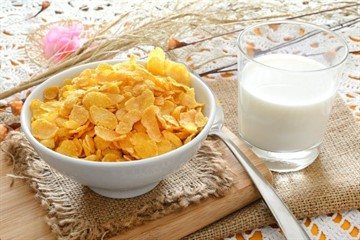
Corn is easily digestible and does not contain gluten, which often causes allergies in children. Therefore, high-quality flakes without additives will not harm the mother and baby.
This product will saturate the woman’s body with vitamins and minerals, the deficiency of which is often observed after childbirth. With breast milk, the baby’s body receives all the components of the dishes that the mother eats.
The starch and fiber contained in the flakes will have a beneficial effect on the child’s growth and the functioning of his digestive system. Also, the corn product saturates the baby’s body with vitamins and microelements that are needed for good immunity and proper development.
Today the range of corn flakes is very wide. On the shelves you can see options with honey, chocolate, baked milk and other additives. This option for a quick breakfast is very tasty, but is not recommended during breastfeeding: it can provoke allergies in the baby and disturbances in the gastrointestinal tract.
You should not include corn flakes in your diet immediately after giving birth. The first months are adaptive for the child. During this period, a woman needs to adhere to a strict diet. When the baby turns three months old, the mother can diversify her menu with cereal.
If a child has a tendency to allergies, suffers from flatulence and colic, then the corn product should be abandoned until the functioning of the baby’s digestive and immune systems is normalized.
Benefit
The product in question can be called useful only if corn flour is used as the basis for its production. It is she who has a positive impact. As mentioned above, derivatives of the type of grain in question help with intestinal function, therefore they are used as the first complementary food during lactation. But the addition of various chemical flavors and sweeteners makes the product dangerous. There are frequent cases of the development of an allergic reaction in adults - skin rashes, swollen lymph nodes, attacks of suffocation.
During breastfeeding, chemicals quickly penetrate into mother's milk, so they quickly begin to be processed by the baby's body.
This is important: If a young mother wants something sweet, she should start with oatmeal cookies or biscuits, which she prepared herself. You should also eat sweets after breastfeeding to maximally prevent the penetration of harmful substances into the baby's body.
How to choose?
Today, markets, stores and supermarkets offer corn flakes, which differ in composition, cost, and manufacturer. It is important for a nursing woman to know the criteria for choosing a quality product. First of all, you should pay attention to the composition.
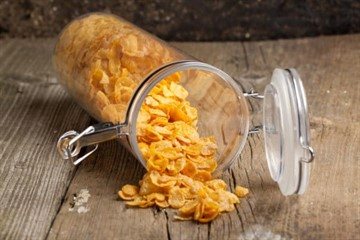
A high-quality and natural product contains corn flour or cereal, butter, sugar. Salt is allowed. There should be no additional additives.
Some manufacturers indicate on the packaging that the product is enriched with vitamins. These substances are usually artificial and do not provide any benefit to the body.
It is necessary to give preference to products from well-known brands, which are famous for their high quality and natural composition. It is important to pay attention to the expiration date and compliance of storage conditions in the store with the manufacturer’s recommendations. Before purchasing, you need to inspect the packaging for integrity.
Reasons why you should discard the product
Of course, vitamins and other useful substances are contained here in large quantities. But the thing is that almost all the vitamins that are indicated on the packaging are of artificial origin.
That is, most of everything useful that is contained in corn is simply removed during heat treatment. Manufacturers, in order to lull parents' vigilance, supply the product with artificial vitamins
.
But this not only has no value, but is also extremely harmful to health, not only of the mother, but also of the baby, which is especially important.
is very important that such a product is not the main dish for breakfast.
. If you start your day with sweets, you can soon suffer from diabetes, as well as other diseases. Also, if your baby’s day starts with sweets, there is no doubt that he will soon develop the wrong taste preferences. And this often becomes the reason for increased consumption of harmful foods in the future.
Important!
The main ingredient of such a product is cooked corn grain, which does not have a shell, and not corn flour. At elevated temperatures, the mass is squeezed out and dried; it is clear that after such a procedure, not many useful properties remain.
Directions for use and precautions
Corn flakes are a simple, tasty and inexpensive option for breakfast or snack. During lactation, a woman should think first of all about the health and safety of her child. You should not overuse corn flakes. They can lead to increased gas formation, colic, and an allergic reaction in the child.
- diabetes mellitus of the second form;
- caries;
- obesity;
- increased blood clotting;
- individual intolerance to the product;
- disorders in the intestines and stomach.
Corn flakes should be introduced into the diet carefully. First, a woman should try one tablespoon of the product diluted with water. The child should be monitored over the next two days. If the baby has increased gas production, a rash on the body, or diarrhea, then it is worth postponing the introduction of a new product.
If there are no negative changes in the baby’s condition, then you can continue to eat corn flakes. The size of a single portion should be increased gradually. You should eat a dish of corn flakes no more than 2-3 times a week. This will be quite enough to saturate the body with useful substances without harm to your figure and health.
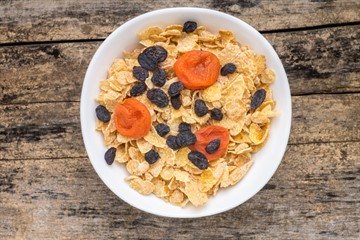
It is recommended to consume corn flakes in the first half of the day. They are suitable as a second breakfast snack. They should not replace a full meal.
The fact is that they are quickly digested. After a short time, the woman will begin to feel hungry again. This can lead to overeating. It is not recommended for nursing women to dilute cereal with cow's milk.
It is better to use hot water for this. If you want to improve the taste, you can add some dried fruits.
Can it be in a child’s diet?
Maybe only in this case maximum caution should be observed, since the baby’s body is highly sensitive. So, you need to follow these rules :
- When the first tasting is carried out, the baby can be given very little flakes (to be more specific - no more than 3 tablespoons). The product can be served in any form (with milk, water, provided that it is not introduced into the diet in dry form).
- In the first 2 days, you need to carefully monitor the reaction of the baby’s body; the slightest changes in intestinal function should warn the young mother. An important negative manifestation is a rash on the skin.
From what age?
As already mentioned, a three-month-old baby can already have corn flakes in complementary foods (if there are no special restrictions in the form of an allergic reaction). If, after starting to consume such a product, the baby’s body does not show itself with negative manifestations, then the amount of complementary foods can be increased. A baby can consume a maximum of 70 grams of product per day, but not more than 250 grams per week.
Despite the fact that there are a lot of useful substances here, experts recommend that in the first six months after lactation you eat corn flakes cooked not with milk, but with water. Milk contains cow protein, which can be dangerous.
Then gradually the water can be diluted with milk , and corn flakes can be completely cooked in milk when the baby has reached the age of six months. The baby's first complementary feeding is often carried out with just such a product.
